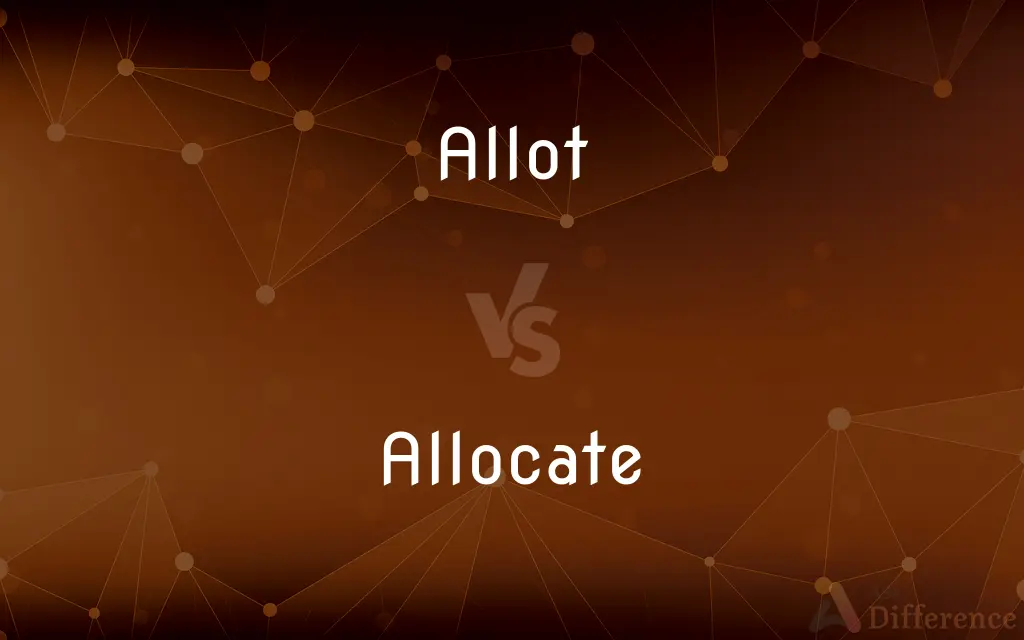Allot vs. Allocate — What's the Difference?
By Urooj Arif & Fiza Rafique — Updated on April 2, 2024
Allot refers to the distribution of resources or tasks among a number of recipients, while allocate focuses on the distribution with specific purposes or areas in mind.

Difference Between Allot and Allocate
Table of Contents
ADVERTISEMENT
Key Differences
Allotting involves dividing or distributing something, like time, resources, or tasks, among several recipients or for various uses, often in equal or predetermined parts. It emphasizes the act of apportioning without necessarily specifying the purpose of each portion. On the other hand, allocating typically involves not just the division but also the assignment of resources or tasks with specific objectives or projects in mind. It implies a more strategic distribution based on priorities or needs.
While allotment is often about fairness or equality in distribution, allocation is more about efficiency and effectiveness, aiming to optimize the use of resources according to specific goals or requirements. This means that when you allot, you might be dividing resources evenly among participants, whereas when you allocate, you consider the unique needs or roles of each participant or project.
Allotting can be seen in scenarios like dividing classroom duties among students or distributing work hours among employees, where the focus is on equitable distribution. Allocation, however, is used in contexts like budget planning or project management, where resources are distributed based on strategic planning to achieve certain outcomes.
The process of allotment is generally simpler, focusing on the equitable or predetermined partitioning of resources. Allocation, by contrast, involves a more complex decision-making process that takes into account the goals, priorities, and potential returns of different allocations, requiring analysis and planning.
Comparison Chart
Definition
To distribute or assign resources or tasks among recipients, often equally.
To distribute resources or tasks with specific purposes or to specific areas.
ADVERTISEMENT
Focus
Equitable division without specific objectives.
Strategic distribution based on goals or needs.
Common Usage
General division of resources like time or duties.
Distribution with a particular objective in mind, such as budgeting.
Purpose
Fairness or equality in distribution.
Efficiency and effectiveness in achieving specific outcomes.
Complexity
Simpler process focusing on equitable partitioning.
Involves planning and analysis to optimize use according to priorities.
Compare with Definitions
Allot
Used in contexts requiring equitable or predetermined partitioning.
Each team was allotted the same amount of practice time.
Allocate
Involves analysis and planning to optimize resource use.
Time was allocated after careful consideration of the project’s phases.
Allot
Concentrates on the division of resources or tasks.
The committee allotted tickets to members based on their contributions.
Allocate
Distribution according to specific goals or areas.
Budget was allocated towards marketing and product development.
Allot
To distribute or assign among a number of recipients.
The teacher decided to allot one chapter to each student for the group presentation.
Allocate
Implies distribution based on priorities or needs.
The project manager allocated more resources to critical tasks.
Allot
Often implies an equal or fair distribution.
The manager allotted equal working hours to each employee.
Allocate
Utilized in contexts like budgeting or project management.
A significant portion of the budget is allocated for research and development.
Allot
The process typically does not involve complex decision-making.
The funds were allotted among the departments without specific guidelines.
Allocate
To distribute for a specific purpose or to particular recipients.
The government allocated funds specifically for disaster relief efforts.
Allot
Allot Ltd., formerly Allot Communications, is an Israeli high-tech company that manufactures telecommunications equipment.
Allocate
To set apart for a special purpose; designate
Allocate a room to be used for storage.
Allot
To parcel out; distribute or apportion
Allotting land to homesteaders.
Allot blame.
Allocate
To distribute according to a plan; allot
Allocate rations for a week-long camping trip.
Allot
To assign as a portion; allocate
Allotted 20 minutes to each speaker.
Allocate
To set aside for a purpose.
Please do not eat the meringue, as it is allocated for the dinner party tomorrow.
Allot
(transitive) To distribute or apportion by (or as if by) lot.
Allocate
To distribute according to a plan, generally followed by the adposition to.
The bulk of K–12 education funds are allocated to school districts that in turn pay for the cost of operating schools.
Allot
(transitive) To assign or designate as a task or for a purpose.
Each candidate was allotted five minutes to make a presentation in front of the judges.
Allocate
(computing) To reserve a portion of memory for use by a computer program.
Allot
Misspelling of a lot
Allocate
To distribute or assign; to allot.
Allot
To distribute by lot.
Allocate
To localize.
Allot
To distribute, or parcel out in parts or portions; or to distribute to each individual concerned; to assign as a share or lot; to set apart as one's share; to bestow on; to grant; to appoint; as, let every man be contented with that which Providence allots him.
Ten years I will allot to the attainment of knowledge.
Allocate
Distribute according to a plan or set apart for a special purpose;
I am allocating a loaf of bread to everyone on a daily basis
I'm allocating the rations for the camping trip
Allot
Give out or allot;
We were assigned new uniforms
Allot
Allow to have;
Grant a privilege
Allot
Administer or bestow, as in small portions;
Administer critical remarks to everyone present
Dole out some money
Shell out pocket money for the children
Deal a blow to someone
Common Curiosities
What does it mean to allot something?
To allot something means to distribute or assign it among several recipients, often in equal or predetermined parts.
What does allocate mean?
To allocate means to distribute resources or tasks with specific purposes in mind or to specific areas or recipients.
Is the process of allocation more complex than allotment?
Yes, allocation often involves more complex decision-making, including planning and analysis, to optimize resource use according to priorities.
Can both allotment and allocation be used in financial contexts?
Yes, both terms can be used in financial contexts, but allocation is more common when referring to budgeting and strategic fund distribution.
Can the outcome of allocation vary based on the analysis?
Yes, the outcome of allocation can vary significantly based on the analysis of needs, priorities, and potential returns of different allocations.
Can a person allot and allocate resources simultaneously?
A person can use both processes simultaneously, allotting resources among recipients and allocating specific portions for particular objectives.
Do both terms imply a fair distribution of resources?
Allot generally implies a fair or equal distribution, while allocate focuses more on efficiency and effectiveness, which may not always be equal but is aimed at achieving specific outcomes.
How do allot and allocate differ in focus?
Allot focuses on equitable distribution without specific objectives, whereas allocate emphasizes strategic distribution based on priorities or goals.
Is it possible to reallocate resources after an initial allocation?
Yes, resources can be reallocated as needs, priorities, and goals change, allowing for flexibility in planning and optimization.
How important is strategic planning in allocation?
Strategic planning is crucial in allocation as it ensures resources are used efficiently to meet specific goals or needs.
How do different industries use the concepts of allotment and allocation?
Different industries use these concepts to manage resources like time, money, and personnel, tailoring the distribution approach to their specific needs and goals.
Can the principles of allocation be applied to personal finance?
Yes, the principles of allocation can be applied to personal finance, such as budgeting and investing, to optimize the use of personal resources.
Is it more common to allot time or to allocate it?
It's common to use both terms for time distribution, but "allocate" is often used when assigning time to specific tasks or purposes.
How do companies decide what to allocate resources to?
Companies decide on allocation based on strategic objectives, market analysis, and efficiency evaluations to achieve the best possible outcomes.
Does allocation always lead to better resource use than allotment?
Allocation, due to its strategic nature, often leads to more efficient and effective use of resources compared to simple allotment.
Share Your Discovery

Previous Comparison
Arid vs. Semiarid
Next Comparison
Glad vs. ProudAuthor Spotlight
Written by
Urooj ArifUrooj is a skilled content writer at Ask Difference, known for her exceptional ability to simplify complex topics into engaging and informative content. With a passion for research and a flair for clear, concise writing, she consistently delivers articles that resonate with our diverse audience.
Co-written by
Fiza RafiqueFiza Rafique is a skilled content writer at AskDifference.com, where she meticulously refines and enhances written pieces. Drawing from her vast editorial expertise, Fiza ensures clarity, accuracy, and precision in every article. Passionate about language, she continually seeks to elevate the quality of content for readers worldwide.














































